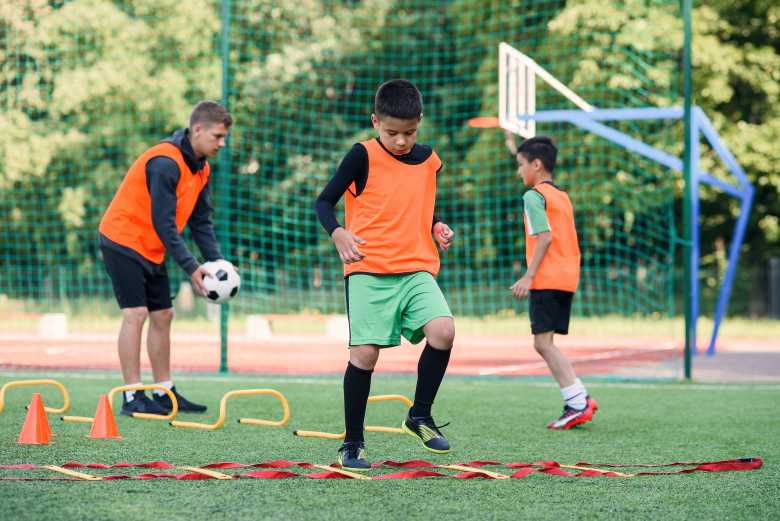
Sport Management Degree Jobs (Skills, Duties & Salaries)
See 16 Jobs you can do with a Sports and Leisure Management Degree
If you're looking to embark on a degree in sport or leisure management but are trying to decide if a degree in sports management is worth it or you have just qualified and want to access which career options a degree in sports management gives you, then this is the article for you.
In this article we cover:
What the degree involves
Skills needed for a career in sports management
Best jobs with a sports management degree (salaries, duties and employers)
What does a sports management degree involve?
Each sports management degree covers different topics, but there is a large amount of crossover from one degree programme to another, which we have outlined below for you.
Within most degree programmes you will learn via a combination of lectures, seminars, workshops, independent and practical study, but this does vary based on the higher education's delivery style.
Sports Management Degree Modules
Some of the sports management degree modules might be optional depending on which avenues you explore in later years:
Financial Accounting - Learning how to understand key financial statements such as profit and loss and cash flow, income and expenditure statements.
Research Methods - Learn the basic research methods utilised for your study programme and beyond.
Principles of Sport Marketing - You will learn the foundations of marketing within sporting organisations and their impact.
Social Sciences - Learn the social science theories and key talking points that relate to sport and sport coaching.
Sports Law, Equity and Inclusion - Understand laws within sport, how it is applied and topics around equity, inclusion and exclusion within sport.
Sport Coaching - Cultivate a comprehensive understanding of sport coaching and coaching practices that is backed by evidence and research.
Leisure Market - Effectively apply microeconomic theories and concepts through practical examples in the sports and leisure industries.
HR within sport and Leisure - Understanding the role HR plays within sporting organisations and how it affects employees and employers.
Economic Analysis of Sport - Learn how markets operate, sporting organisations function and key economic issues within sport.
Accounting - See how accounting is harnessed by managers to make financial plans and informed business decisions.
Perspectives in Sports Management - Familiarise you with critical issues and current discussions pertinent to sports managers operating in a multifaceted social, political, financial, and progressively global context.
Physical activity and health - Gives you a basic knowledge of physical activity, health and associated behaviour across different demographics.
Sport Policy and governance - Learn how polices, practices and procedures are created and implemented across governing bodies and sporting organisations.
Leadership and Management - Learn the different theoretical ways of leading a team and how leadership shapes an organisation.
Most sports management and leisure degree programmes are assessed by a combination of in-person examinations and coursework, but this varies from module to module, with some being assessed by exam only and others by coursework submission only.
What skills are important for a Career in Sports Management?

There are a number of useful skills that a career in sports management requires, below we have outlined our top 8 essential skills that would put you in good stead for a career sports and leisure management:
1. Analytical Skills
Having strong analytical skills is an important skill for sports managers as most jobs require you to understand and interpret financial reports like profit and loss reports, as well as make data driven decisions based on employees performances, sales, risks, resource allocation, complaints and marketing.
Being able to interpret data and make appropriate actions can influence the direction of a particular job role or initiative, allow you to identify areas of weakness or risk in the business model and work to implement strategies to improve it.
2. Communication
Communication is an important skill for a career in sports management and this ranges from the body language you adopt, the tone and speed of your voice through to how you visually represent what you’re trying to put across.
When communicating it is important to be clear, concise and to avoid necessarily over complicating what you say, especially as with a career in sports management you will be doing lots of performances, reviews, presentations, meetings and collaborating with team members.
3. Leadership
In any managerial position you need you need to know how to lead a team, which involves getting the best levels of performance out of your staff, whilst sustaining a harmonious and positive environment.
You need to be able to adapt your leadership style for different situations and individuals based on their individual personalities and have empathy and awareness of their unique motivation triggers.
Being able to lead from the front, set clear direction, being honest with your team and showing them respect will put you in a good standing when starting out in your sport or leisure management career.
3. Problem Solving
Virtually all sports management roles require your ability to solve problems and issues that may arise. You will have to learn to identify problems potentially before they become an issue, brainstorm ideas, consider the options available to you and then implement a solution.
This level of thinking is critical in a sports management role as issues with staff, conflicts, valid complaints and issues with processes are common obstacles in the workplace that require someone with good problem solving abilities to handle.
4. Sales and marketing
You need at minimum a basic understanding of sales and marketing as if you plan to work in a sports management role, part of your job will depend on growing the business and in order to do that you need a working knowledge of sales systems and marketing fundamentals.
This will help you make better informed and strategic decisions, manage resources better, understand and effect the key metrics that may underpin your success and help you bridge the gap between the two departments to create a more fluid and coordinated effort to yield better results.
5. Teamwork
Teamwork is crucial in every aspect of life, but it is very understated when it comes to a career path in sports management.
You need to know how to delegate tasks and responsibilities to other people, which gives them purpose, drive and helps build stronger working dynamics.
Additionally, by getting other team members involved helps recognise their worth, improves morale, increases team productivity and helps everyone feel valued and a part of what the company’s aims are.
Whether that’s through collaborative marketing ideas, asking their opinion on a process or building an environment where they can openly share their expertise, experience and ideas.
From time-to-time you also need to help your team out, take the load of them during busy periods and lead from the front, which builds trust and respect from your colleagues.
Explore Jobs in the Outdoor Activity Sector
Explore Active Career' range of jobs in the outdoor education sector from some of the UK's largest employers
6. Multi-tasking
The ability to multi-task effectively is essential when following a sport or leisure management career as most roles require you to juggle a plethora of tasks including; onboarding staff, planning events, providing training, creating sales plans, ordering supplies, processing payroll, conducting performance reviews and facilitating meetings, amongst many other duties.
Your ability to multi-task will help you stay organised, avoid distractions, prioritise the right tasks, know what to delegate to others as well as increase your overall productivity.
7. Conflict Resolution
Conflicts are inevitable in the workplace to some extent, which stem from a whole variety of reasons, from differences in personality, communication styles, different approaches onhow to get a task complete, someone believing another person is not pulling their weight through to having different core beliefs or ethics.
Conflicts can create negative work environments, lead to tasks not getting completed, affect team morale and result in good team members leaving when it is not resolved correctly.
Someone who is adept at conflict management can identify the root causes early, is a good listener to both sides of arguments, can address issues constructively and create amicable solutions so that both parties feel happy and sets clear guidelines for future expectations regarding behaviour.
8. Basic Legal and HR Knowledge
We're not saying that you need to be a qualified lawyer or HR expert, but you do need some comprehension of the law and employee rights when being a manager in a sporting setting.
Additionally, many sports management jobs require you to be customer facing, manage a team of employees and work in an environment where there are potential health and safety hazards.
You will be issuing staff employment contracts, handling sensitive data, dealing with grievances, complaints and accidents, which all come with potential legal obstacles, which is why ascertaining an understanding is important.
Getting familiar with laws, employee rights and health and safety regulations will enable you to navigate risks, problem solve better, recognise staff boundaries, performance manage employees with confidence and maintain compliance.
What Jobs Can I do with a Sports Management Degree?

There are a number of jobs with a sports management degree that you can pursue post degree completion.
Below we have outlined the top 16 jobs that you can pursue with average salaries, duties and key industry employers for each job role.
DISCLAIMER: The jobs and average salaries listed below are primarily based on roles posted on our jobs board, however some are sourced from research and using third party data to give you a salary indication based on their average salaries, which we have rounded to the nearest £1,000 per year.
1. Sports Event Coordinator
Average Salary: £31,000 per Year
Starting off our list of jobs you can do with a sports management degree is that of a sports event coordinator.
The responsibilities involved are somewhat in the job title, you’ll be “coordinating” and organising all the logistics associated with running an efficient sporting event, whether that be a race, obstacle course, expo or festival.
This role is quite diverse as you will not just have to forge positive relationships with brands and sponsors, but also secure licenses and relevant permits, assist the marketing team in promoting the sporting event as well as hiring staff, renting equipment, sorting transportation or even accommodation for key guests.
Additionally event coordinators have to lead a team to set-up and run the event efficiently, but also ensure it is compliant with health and safety procedures and protocols.
There is also some forecasting, reporting and contingency planning needed within this role, which is where a sports management degree comes into real effect as that’s very often covered with the degree programme.
Who Employs Sport Event Coordinators?:
Fitness Event Companies like Tough Mudder or
Sport Expos
Charities that hold fitness or sporting events to raise money
Non for profit organisations
Schools
Professional sports teams
Large sporting brands
2. Sports Camp Manager
Average Salary: £30,000 per Year

Did your parents ever cast you off to a sports camp over the summer holidays, whether it be football camp, rugby or whatever your favourite sport was? (Just me then).
This is where a sports camp manager works, overseeing the smooth operations and management of the sports camp, from planning and scheduling the activities through to making sure that all lessons are interactive and fun, and that the kids are having a memorable experience.
Sports camp managers will have to onboard relevant staff and coaches, create timetables, deal with parents' concerns and are the focal point for ensuring the safeguarding of all kids on site.
There are a number of administration tasks that you will be accountable for, including documenting any accidents, employee budgeting, completing risk assessments and providing financial and attendance reports.
Who Employs Sport Camp Managers?:
Schools
Football and rugby Academies
Outdoor learning centres
Not-for-profit organisations that promote sports and outdoor education
Sport Centres
View the latest jobs in the wellness sector
Explore the latest jobs and careers in the wellness industry from some of the leading brands in the UK
3. Leisure Operations Manager
Average Salary: £30,000 per Year
If you’re a gym fanatic and want to combine both your degree in sports management with your love for fitness, then the role of a fitness operations manager could be the right path for you.
As someone who has done this role in my younger days, I can tell you that it is a good route to go down if you want to progress into more senior managerial roles within health, fitness or leisure.
As a leisure operations manager it is your job to ensure the fitness facility is compliant with various legislations from the Health and Safety at Work Act through to them being COSHH trained (Control of Substances Hazardous to Health).
As a leisure operations manager you will be responsible for conducting risk assessments, training staff in safety protocols, daily equipment checks and that the facility is clean and well maintained.
Operations managers play a key role in recruiting gym staff under their remit, which can include everything from employing lifeguards, cleaners and front of house or bar staff.
Who Employs Leisure Operation Managers?:
Leisure Centres
Sports Clubs
Sport Recreation Centres
Health Clubs
4. Sports Writer
Average Salary: £31,000 per Year

A good career option with a sports management degree is that of a sports writer, especially if you have strong english skills and a particularly keen interest in a certain sport, whether that being something mainstream like football or tennis or something a little more obscure like bob sledging or canoeing, there are sports writing roles in every sporting discipline.
The nature of this role varies based on the purpose you’re writing for. For example, I am writing this blog post as you probably typed into Google something like “what can you do with a sports management degree” and the purpose I’m writing this is to make you aware of the career options you have and the jobs available on our website.
Major sports brands do the exact same thing, whether it’s writing product reviews, how to guides, giving nutritional advice or training tips, with the aim of getting potential customers engaged with their product or service.
Working in a more journalistic capacity, you might find yourself covering newsworthy stories, writing creative content pieces, conducting interviews with athletes or influential people within the sport and even find yourself appearing on the radio or TV to give your thoughts or opinions.
Who Employs Sport Writers?
Sporting Magazines
Sport Brands of all sizes that hire content writers
Newspapers
Sporting associations
Press and PR Teams
5. Sports Retail Manager
Average Salary: £36,000 per Year
A fast paced job that you can do with your sports management degree is working in retail as a store retail manager.
As a retail manager you will be accountable for the sales and operations of the store, which extends to ensuring all staff are appropriately onboarded and trained through to making sure that the store is clean, tidy and visually well presented to customers when entering the store.
Sports retail managers' roles are high intensity as they have a wide range of duties and obligations, from performing inventory checks, overseeing the security of the store, creating staff schedules, monitoring budgets, financial reporting and handling customer complaints, It really is a job that entails a broad skill set and is a very customer facing position.
Who Employs Sports Retail Managers?
Sports Clothing Brands
Gym Equipment companies
Sport specific outlets
6. Sports Analyst
Average Salary: £35,000 per Year

A very viable career path with a sports management degree is to pursue the role of a sports analyst.
Sports Analysts watch matches of a particular sport and record players and teams performances based on data produced across a variety of different metrics depending on the sport or position.
You will have to create detailed reports and visual representations of performances, comparing data sets over different time periods, highlight trends and provide performance projections based on historical data that can be used to explain a teams or players output.
You will need strong knowledge of a particular sport and have some technical proficiency to be applicable for this type of role, but when you consider you’re literally paid for watching sport, it definitely is a very appealing job to many.
Who Employs Sports Analysts?
Sports Betting Companies
Sport Statistical Software companies
Sporting media outlets
Sports marketing companies
Find the latest jobs that involve Nutrition
Discover the latest roles that involve nutrition including part-time, full-time and freelance positions
7. Sports Administrator
Average Salary: £27,000 per Year
A sports administrator is someone that facilitates the operational functions of a sporting department, normally at universities, colleges or schools.
Sports administrators need to be highly organised and great at managing multiple tasks at once, as you will have to supervise all sport related bookings, act as the middle man between students and the organisation, provide admin support to heads of departments and handle enquiries, queries and complaints from parents and students alike.
Sports Administrators also help in the development of marketing materials such as flyers, posters and digital campaigns and provide insights and reports back to heads of department on the output of sporting initiatives.
Additionally, sports administrators will help with the orchestration of sporting events, which includes scheduling, transportation, and equipment setup, in addition to engaging with aspects of the local community to help promote the event or gain sponsorship.
Who Employs Sports Administrators?
Schools, college and universities
Sports clubs
Governing bodies
Sport based learning initiatives
8. Fitness Manager
Average Salary: £29,000 per Year

A fitness manager is someone who heads up the fitness department at a gym, leisure facility or studio, traditionally responsible for supporting a team of fitness professionals.
Fitness Managers hire fitness staff like class teachers, gym instructors and personal trainers, depending on the facilities set-up towards KPI targets, which focus on member engagement, class attendances and secondary ad spend on things like supplements and heart rate monitors.
Fitness Managers have to help mentor staff, provide ongoing training, conduct performance reviews, ensure the gym is properly manned and clean at all times, as well as implement a fitness programme that staff can easily implement to help members realise their fitness goals.
You will report to a general manager on the financial performance of the department, customer feedback and member retention and devise ways of helping to further drive the department forward.
Who Employs Fitness Managers?
Gyms, health clubs and leisure centres
Hotel chains with fitness facilities
Universities with gyms on site
9. Sports Compliance Officer
Average Salary: £40,000 per Year
A sports compliance manager is a bit of a different towel to many on this list, as it is a role that helps competitive sporting based organisations adhere to regulatory standards and practices imposed by sporting governing bodies.
Their main duties include creating of risk management strategies and polices that help clubs maintain sporting integrity, offer educational and training support to facilities under their remit to stay complaint and monitoring and auditing of the organisation’s practices, giving constrictive feedback so they can enhance their internal systems.
In the event of a suspected violation, Sports Compliance Officers investigate the issue and they ultimately are the ones who reprimand sports clubs for any malpractice, which can include issuing of fines, as well as more serious sanctions where necessary.
Who employs Sports Compliance Officers?
Sporting Governing Bodies
Universities
Sport associations, accreditors and regulators
10. Multi-Sports Coach
Average Salary: £28,000 per Year

Another career idea if you have a sports management degree is to go into sports coaching, which can either be a general role or a sport specific one e.g. rugby coach, tennis coach etc.
Most sports coach roles encompass working with children of various ages and entails creating sport sessions that are not just fun but also educational, focusing on developing fundamental movements that are crucial in early childhood development, as well as sport-specific skills.
You will supervise various activities, ensuring that all students are not only following the rules but are also actively engaged and learning new soft skills like teamwork, leadership and perseverance.
Safety is always the number one priority of a Sports coach and they need to record incidents if and when they occur, behaviour manage the children effectively against company policies, but give them ample opportunity to express themselves in a competitive environment.
Who Employs Multi-sports Coaches?
Initiatives that promote sporting participation
Private sport based academies
After School clubs
Not for profit organisations
See all the latest jobs in Sport Coaching
See all the latest jobs in sport coaching on Active Careers from across the physical activity and sport industry
11. Gym Manager
Average Salary: £34,000 per Year
If you like the idea of working in a gym based setting, then a career where a sports management degree is very applicable is that of a gym manager.
When you become a gym manager you will oversee the operations, membership sales and targets of the gym, which can mean spearheading a team from just a handful of staff through to 70 employees depending on the size of the gym you’re managing.
You will liaise with heads of departments to create a business plan to drive member engagement, sales, secondary revenue spend and member retention to positively contribute to the gym’s overall aims.
You will have to create a financial forecast, localised marketing plan, training schemes for new staff across a number of departments and ensure the club is meeting health and safety standards and compliance.
Who Employs Gym Managers?
Fitness Studios
Gyms and health clubs
Wellbeing centres and Leisure Centres
Colleges and Universities
Local councils
12. Outdoor Adventure Manager
Average Salary: £38,000 per Year

When thinking about what you can do with a sports management degree, one of the roles that might not have crossed your mind is that of an outdoor adventure manager.
Outdoor Adventure managers are the people that are in charge of the outdoor educational facilities that offer a range of fun outdoor activities from white water rafting, zip wires and high level ropes courses among other activities like archery, kayaking or abseiling.
Outdoor adventure managers are responsible for ensuring that the facility runs smoothly, from onboarding specialist staff within each activity discipline, that have undergone the proper training and that all lessons meet the regulatory standards and curriculum outcomes.
On top of this, you will oversee the development and growth of the centre, pushing sales promotions, creating marketing packages and ensuring that guests have a great overall experience when visiting the facility.
Who Employs Outdoor Adventure Managers?
Outdoor Education Centres like PGL or Go Ape
Outdoor pursuit companies
Charities
National Sport Centres
13. Sports Race Director
Average Salary: £48,000 per Year
Every sporting race, both small and large, professional and amateur needs a sports race director to organise and manage the event, whether it’s a race for rowing, running, swimming or cycling.
Depending on the sport and type of race, a race director has to plan the race, ensure the race complies with rules and regulations, is properly measured, is timed effectively, that the route is clear and that the race is safe for participants to take part.
Additionally, they have to help promote and advertise the race, manage the budget of the event, collaborate with corporate partners and sponsors as well as plan for changes in the weather or potential accidents.
There is a lot to think about as a sports race director, but if you want a job that allows you to pursue a career in running or a career in swimming, where race directors are prominent, this could be a great ft for you.
Who employs Sports Race Directors?
Sporting associations
Running Events
Sporting regulators
14. Sports Sponsorship Manager
Average Salary: £41,000 per Year

When you go to a sporting event like a 10km race, the event will be sponsored by a brand, same as when you go to a fitness expo or an awards show. This is where the role of a sponsorship manager comes into fruition, they liaise with brands, both large and small to sponsor the event and get exposure to their products and services.
You will have to be able to develop a sponsorship strategy, which can include manual outreach and marketing to targeted brands that would suit your event’s audience, as well as having to pitch to business’ and negotiate sponsorship rates and packages.
This job requires working to set marketing and sales KPIs (key performance indicators) and tight deadlines and you have to report results and metrics back to brands and event organisers on the performance of the event.
Who Employs Sports Sponsorship Managers?
Professionals and amateur sporting events
Sports Clubs
Fitness and Sport Expositions
Event Management companies
Sport marketing agencies
Charities that run sporting or fitness events
Large sporting brands
View the latest positions from across the fitness sector
View all the current jobs advertised in the fitness sector, from some of the UK's largest fitness operators
15. Sports Development Officer
Average Salary: £30,000 per Year
A good career option with a leisure management degree or sports management degree is that of a Sports Development officer.
Sports Development officers are individuals that tend to work in the community, promoting sports, physical activity, health and fitness within particular demographics within the community that are underrepresented or struggle to access sports.
This could mean helping people from poor backgrounds, have a disability or people from a particular ethnic background where there is a social barrier to getting into sport.
The main focus of the role is to promote participation and engagement with sports, thus you will create initiatives and programmes with the aim of encouraging involvement by creating tournaments and events through liaising with local schools, councils and community centres.
You will have to manage budgets, logistics of events and actively promote and help market the events in the local community to help drive attendance levels.
Who Employs Sports Development Officers?:
Local Councils
Non for profit and community trusts organisations that help with getting people active
Universities that promote sport inclusion to their students
Training providers that work to promote sport and health within schools
16. Sports Performance Analyst
Average Salary: £42,000 per Year
A sports performance analyst is similar in nature to a sports analyst, in that they interpret team and players performances into statical data, however the big difference is how they harness that data, which form a sports performance analyst, that is to help enhance a teams or players performance.
This is a highly sought after role for sports management graduates as you get to work directly with highly established athletes and coaches to help identify weaknesses within their game and create actionable insights that help athletes develop and progress.
You will use a combination of video analysis and software to review games, use wearables to track players movements and physical output, and then give feedback to coaching staff with recommendations on how they can improve performance technically, tactically and physiologically.
You can also work different age groups, across different sports or specialise in certain aspects within a sport or position, which makes this a very exciting career to pursue.
Who employs Sports Performance Analysts?
Amateur and professional sports teams
Individual elite athletes
Sports Academies
Research institutions

